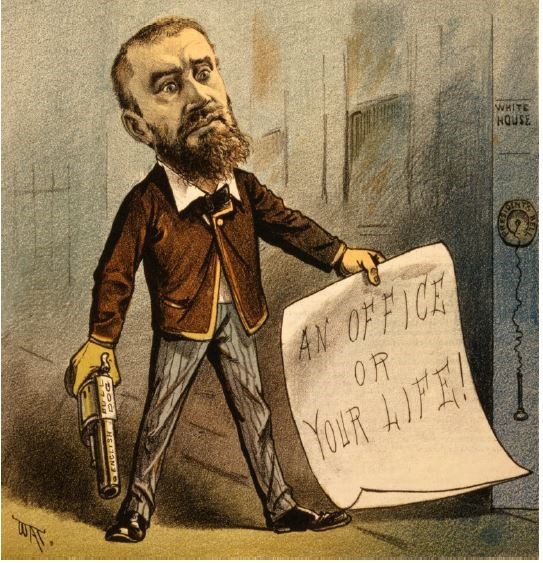Last updated: June 2, 2020
Article
The Trial of the Assassin Guiteau

Library of Congress
On January 12, 1882 closing arguments began in the case of the United States v. Charles Guiteau. Shortly after President Garfield’s death, Guiteau was formally charged with murdering the President. Over the following months, Guiteau's lawyers attempted to plead his case on the defense of insanity, to little avail. Guiteau consistently admitted to his actions against the President, claiming that it was God’s will for him to kill the President, and that he was “… a man of destiny as much as the Savior, or Paul, or Martin Luther.”
Guiteau’s defense was built by medical experts testifying that a man could be insane without suffering from delusions or hallucinations. The prosecution countered, however, with its’ own medical experts. They argued that there was no such disease in science as “hereditary insanity”. Their defense was supported by the fact that it was clear that Guiteau had intent to shoot the President. Guiteau made this evident throughout the trial, stating multiple times that he knew what he had done. Guiteau gave his own closing arguments, looking skyward and swaying while he talked. He sang “John Brown’s Body”, and compared himself as ‘a patriot’ to others such as Washington and Grant. He insisted that “‘the Deity’ allowed the doctors to finish my work gradually, because He wanted to prepare the people for the change.” After the jury’s deliberation, Guiteau was found guilty. While he was removed from the courtroom he continued to insist, “I am here as God’s man...I will go to glory whenever the Lord wants me to go, but I will probably stay down here a good many years and get into the White House. I know where I stand on this business, and so does the Lord, and he will pull me through with the help of two or three good lawyers, and all the devils in hell can’t hurt me.”
Although there were appeals in the following months, Guiteau was eventually hanged on June 30, 1882, two days before the first anniversary of Garfield’s assassination on July 2, 1881.
